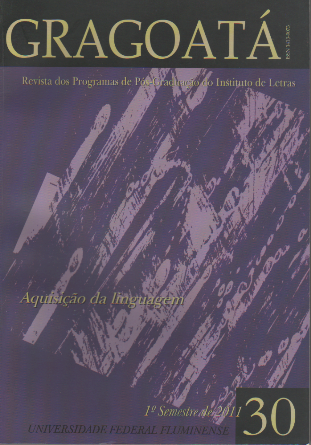Pistas lexicais e sintáticas para a delimitação de adjetivos na aquisição do português brasileiro
DOI:
https://doi.org/10.22409/gragoata.v16i30.32927Palavras-chave:
aquisição da linguagem, adjetivo, bootstrapping, categorias funcionais, afixos derivacionaisResumo
Este artigo apresenta um estudo experimental cujo foco é a delimitação da categoria adjetivo por crianças adquirindo o Português Brasileiro (PB) como língua materna. Adota-se uma perspectiva psicolinguística de aquisição da linguagem, aliada a uma concepção minimalista de língua (CHOMSKY, 1995-2001). Assume-se que a criança é sensível às propriedades fônicas de elementos de classes fechadas, como determinantes e afixos, conforme a hipótese do bootstrapping fonológico (MORGAN & DEMUTH, 1996; CHRISTOPHE et al., 1997). Com base na hipótese do bootstrapping sintático (GLEITMAN, 1990), assume-se que a análise de adjetivos no contexto sintático de DPs ou de small clauses, aliada ao pressuposto de que DPs fazem referência a objetos/entidades, possibilita a representação de adjetivos como categoria que apresenta uma propriedade ou atributo de um referente. Avalia-se, ainda, o papel da ordem canônica, na distinção entre adjetivos e nomes. Apresentam-se dois experimentos com crianças, usando-se a técnica de seleção de objetos com pseudopalavras: o primeiro foi conduzido com crianças de 18-22 meses; o segundo, com crianças de 2-3 anos e 4-5 anos. Os resultados dos experimentos aqui relatados são compatíveis com a hipótese de que a criança faz uso de informação sintática e morfológica na delimitação de adjetivos, e revelam que já aos dois anos de idade propriedades semânticas de sufixos formadores de adjetivos são representadas pela criança.
Downloads
Downloads
Publicado
Edição
Seção
Licença
AUTORIZAÇÃO
Autores que publicam em Gragoatá concordam com os seguintes termos:
Os autores mantêm os direitos e cedem à revista o direito à primeira publicação, simultaneamente submetido a uma licença Creative Commons Atribuição 4.0 Internacional (CC BY 4.0), que permite o compartilhamento por terceiros com a devida menção ao autor e à primeira publicação pela Gragoatá.
Os autores podem entrar em acordos contratuais adicionais e separados para a distribuição não exclusiva da versão publicada da obra (por exemplo, postá-la em um repositório institucional ou publicá-la em um livro), com o reconhecimento de sua publicação inicial na Gragoatá.
A Gragoatá utiliza uma Licença Creative Commons - Atribuição CC BY 4.0 Internacional.











